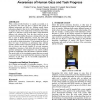Free Online Productivity Tools
i2Speak
i2Symbol
i2OCR
iTex2Img
iWeb2Print
iWeb2Shot
i2Type
iPdf2Split
iPdf2Merge
i2Bopomofo
i2Arabic
i2Style
i2Image
i2PDF
iLatex2Rtf
Sci2ools
HRI
2007
ACM
2007
ACM
Exploring adaptive dialogue based on a robot's awareness of human gaze and task progress
When a robot provides direction--as a guide, an assistant, or as an instructor--the robot may have to interact with people of different backgrounds and skill sets. Different people require information adapted to their level of understanding. In this paper, we explore the use of two simple forms of awareness that a robot might use to infer that a person needs further verbal elaboration during a tool selection task. First, the robot could use an eye tracker for inferring whether the person is looking at the robot and thus in need of further elaboration. Second, the robot could monitor delays in the individual's task progress, indicating that he or she could use further elaboration. We investigated the effects of these two types of awareness on performance time, selection mistakes, and the number of questions people asked the robot. We did not observe any obvious benefits of our gaze awareness manipulation. Awareness of task delays did reduce the number of questions participants...
| Added | 16 Aug 2010 |
| Updated | 16 Aug 2010 |
| Type | Conference |
| Year | 2007 |
| Where | HRI |
| Authors | Cristen Torrey, Aaron Powers, Susan R. Fussell, Sara B. Kiesler |
Comments (0)

